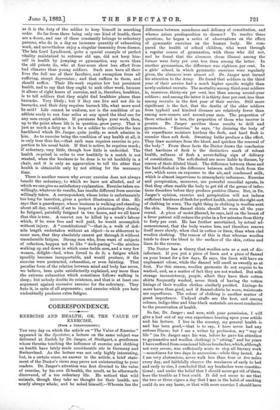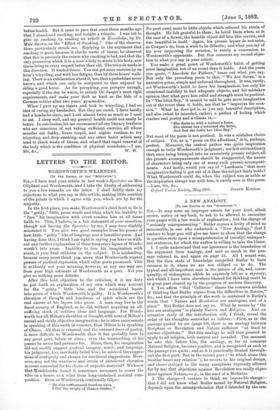CORRESPONDENCE.
EXERCISE AND HEALTH; OR, THE VALUE OF EXERCISE.
[nom • COMMIPONDEFT.] Tnz very day on which the article on "The Value of Exercise" appeared in the Spectator, a lecture on the same subject was delivered at Zurich, by Dr. Jaeger, of Stuttgart, a gentleman whose theories touching the influence of exercise and clothing on health have lately made considerable stir in Germany and Switzerland. As the lecture was not only highly interesting, but, in a certain sense, an answer to the article, a brief state- ment of the Doctor's views may prove not uninteresting to your readers. Dr. Jaeger's attention was first directed to the value of exercise, by his own ill-health, the result, as he afterwards discovered, of a too sedentary life. He noticed that wild animals, though they take no thought for their health, are nearly always whole; and he asked himself,—Wherein lies the difference between soundness and delicacy of constitution, and whence arises predisposition to disease P To resolve these questions, he began a series of observations on the effect of gymnastic exercises on the human body. He com- pared the health of school children, who went through a regular course of gymnastics, with those who did not, and he found that the absences (from illness) among the former were forty per cent. less than among the latter. In another gymnasium, the difference was eighteen per cent. In a girls' school, in which gymnastic exercises were regularly given, the absences :were almost nil. Dr. Jaeger next turned his attention to the Army. He found that soldiers in the third year of their service had a much higher specific weight than newly-enlisted recruits. The mortality among third-year soldiers is, moreover, thirty-six per cent, less than among second-year soldiers ; and among the latter it is thirty-four per cent. less than among recruits in the first year of their service. Still more significant is the fact, that the deaths of the older soldiers from typhoid and kindred diseases are relatively fewer than among new-comers and second-year men. The proportion of those attacked is less, the proportion of those who recover is greater. Dr. Jaeger ascribes these results to drill and gymnastics. "Exercise," he says, "by draining the body of its superfluous moisture hardens the flesh, and hard flesh is sounder than soft flesh. Sweating baths produce a like effect. They draw moisture from the blood, and quicken the renewal of the body." From these facts the Doctor draws the conclusion that hardness of flesh is the distinctive mark of robust health, softness of flesh a never-failing sign of delicacy of constitution. The soft-fleshed are more liable to disease, by reason of their diluted blood. The difference between these and the hard-fleshed is the difference between milk fresh from the cow, which sours on exposure to the air, and condensed milk, which is almost impervious to atmospheric influences. Exercise and perspiration, moreover, are powerful remedial agents, in that they often enable the body to get rid of the germs of infec- tious disorders before they produce positive illness. But, in Dr. Jaeger's opinion, exercise and perspiration will not induce sufficient hardness of flesh for perfect health, unless the right sort of clothing be worn. The right thing in clothing is woollen next the skin. Hence flannel shirts should be worn all the year round. A piece of moist 'flannel, he says, laid on the breast of a fever patient will reduce the pulse in a few minutes from thirty to forty per cent. He has farther ascertained, by actual ad- measurement, that the body wastes less, and therefore renews itself more slowly, when clad in cotton or linen, than when clad woollen clothing. The reason of this is that whereas woollen tends to draw the blood to the surface of the skin, cotton and linen do the reverse.
The Doctor has a theory that woollen acts as a sort of dis- infectant. If you put a piece of linen and a piece of flannel on your breast for a few days, lie says, the linen will have an unpleasant odour, while the flannel will smell as sweetly as at first. For this reason, woollen garments do not require to be washed, and, as a matter of fact they are not washed. But with strange inconsistency, people, albeit they have their cotton shirts frequently washed, never think of having the cotton linings of their woollen clothes similarly purified. Linings do more harm than good, and if flannel-shirts be worn, waistcoats are superfluous. The colour of clothing is another matter of great importance. Undyed staffs are the best, and among colours, indigo-blue and blue-black materials are most conducive to the preservation of health.
So far, Dr. Jaeger ; and now, with your permission, I will give a leaf out of my own experience bearing upon your article and his lecture. I live in the country, my general health is and has been good,—that is to say, I have never had any- serious illness; but I am a writer by profession, my "way of life " (as Dr. Jaeger says his was, before he gave his attention to gymnastics and woollen clothing) is " sitting," and for years I have suffered from occasional bilious headaches, which, although not very severe, was sufficiently acute to stop all literary work —sometimes for two days in succession—while they lasted. As I am very abstemious, never walk less than four or five miles every day, and faithfully observe the maximum of early to bed and early to rise, I concluded that my headaches were constitu- tional ; and under the belief that I should never get rid of them, bore the trouble as I best could. It did not occur to me that the two or three cigars a day that I Nas in the habit of smoking could do me any harm, or that with more exercise I should have better health. But it came to pass that some three months ago that I abandoned smoking, and bought a tricycle. I was led to give up smoking by reading an article in Knowledge, by Dr. Muir Brown, on the "Effect of Smoking." One of the observa- tions particularly struck me. Replying to the argument that smoking is good, because it checks waste of tissue, he observed that this is precisely the reason why smoking is bad, and that the only possession which it is a man's duty to waste is his body, new tissue being in every respect better than old. The tricycle made in this direction. It wasted tissue. You can get more exercise by an hour's tricycling, and with less fatigue, than by three hours' walk- ing. There is an exhilaration about it, too, that a pedestrian never knows, and which can only be compared to that enjoyed by riding a good horse. As for perspiring, you perspire enough, especially if the day be warm, to satisfy Dr. Jaeger's most rigid requirements, and make your flesh as hard as the hide of a German soldier after two years' gymnastics.
When I gave up my cigars and took to tricycling, I had no idea of curing my headaches. But they are cured. I have hardly had a headache since, and I eat almost twice as much as I used to eat. I sleep well, and my general health could not easily be better. In conclusion, let me recommend all my literary brethren who are conscious of not taking sufficient exercise, all whose muscles are flabby, livers torpid, and nights restless, to try tricycling, and drop smoking, and any other habit which may tend to check waste of tissue, and retard that rapid renewal of the body which is the condition of physical soundness.—I am,















































 Previous page
Previous page